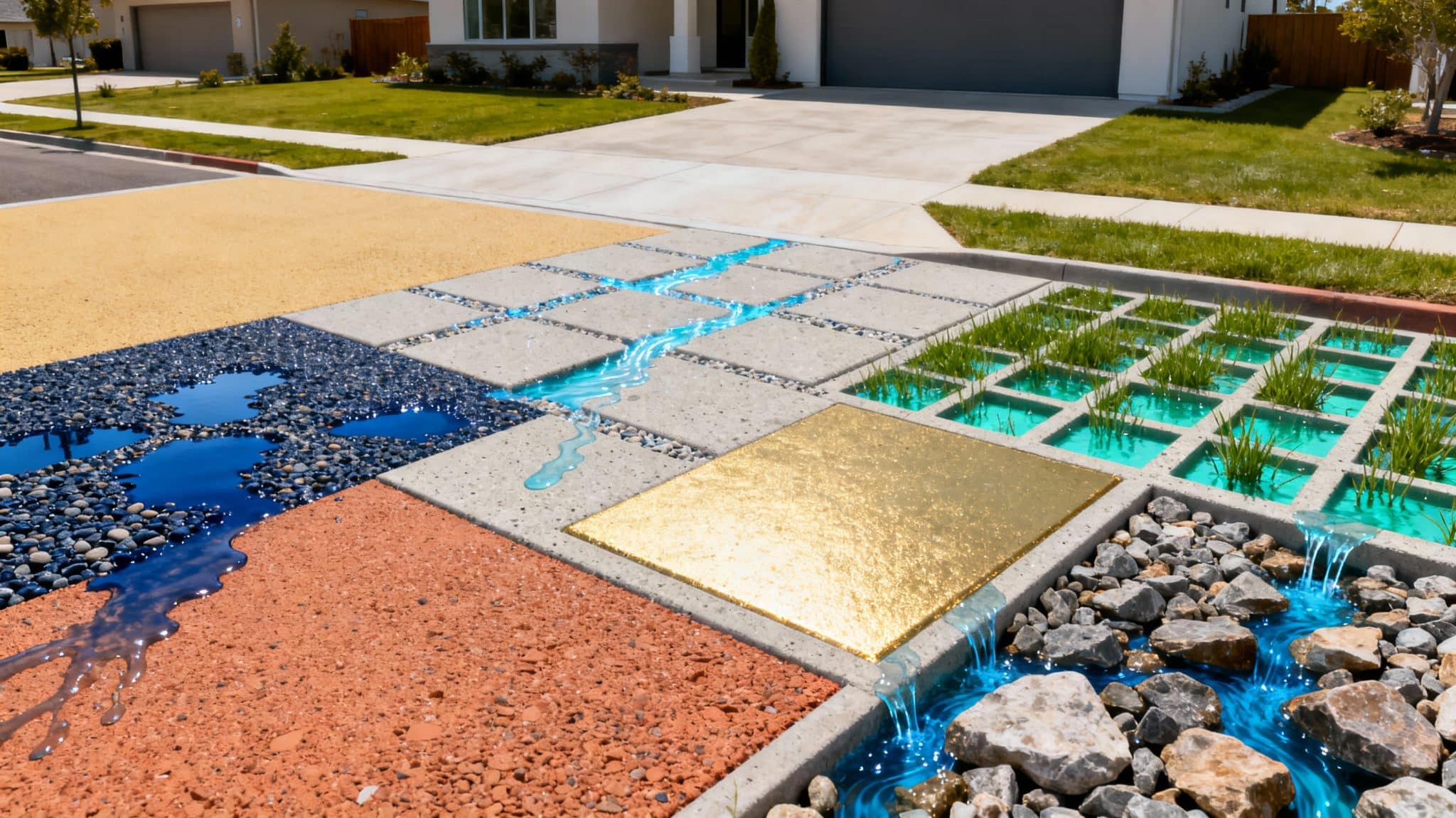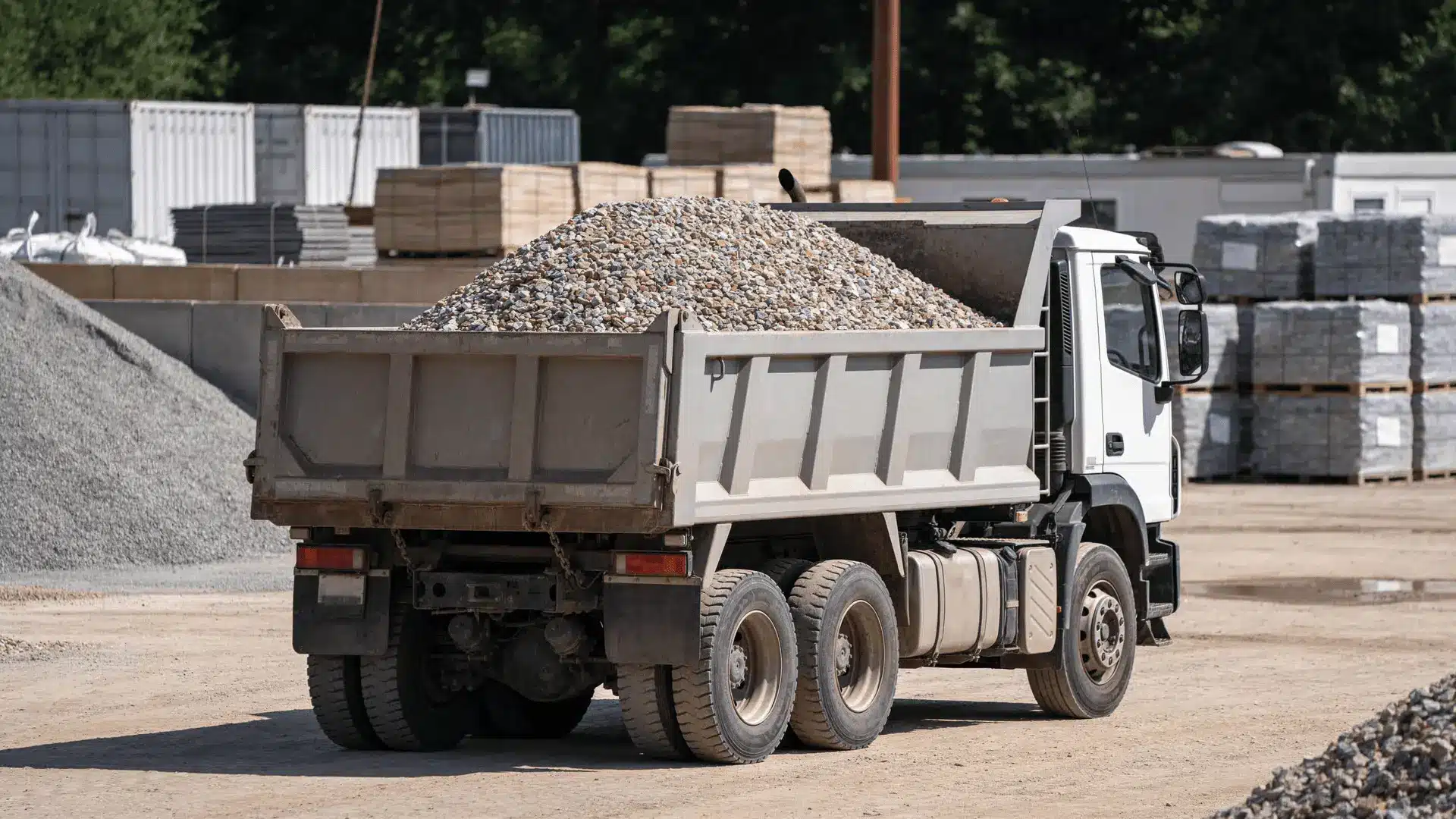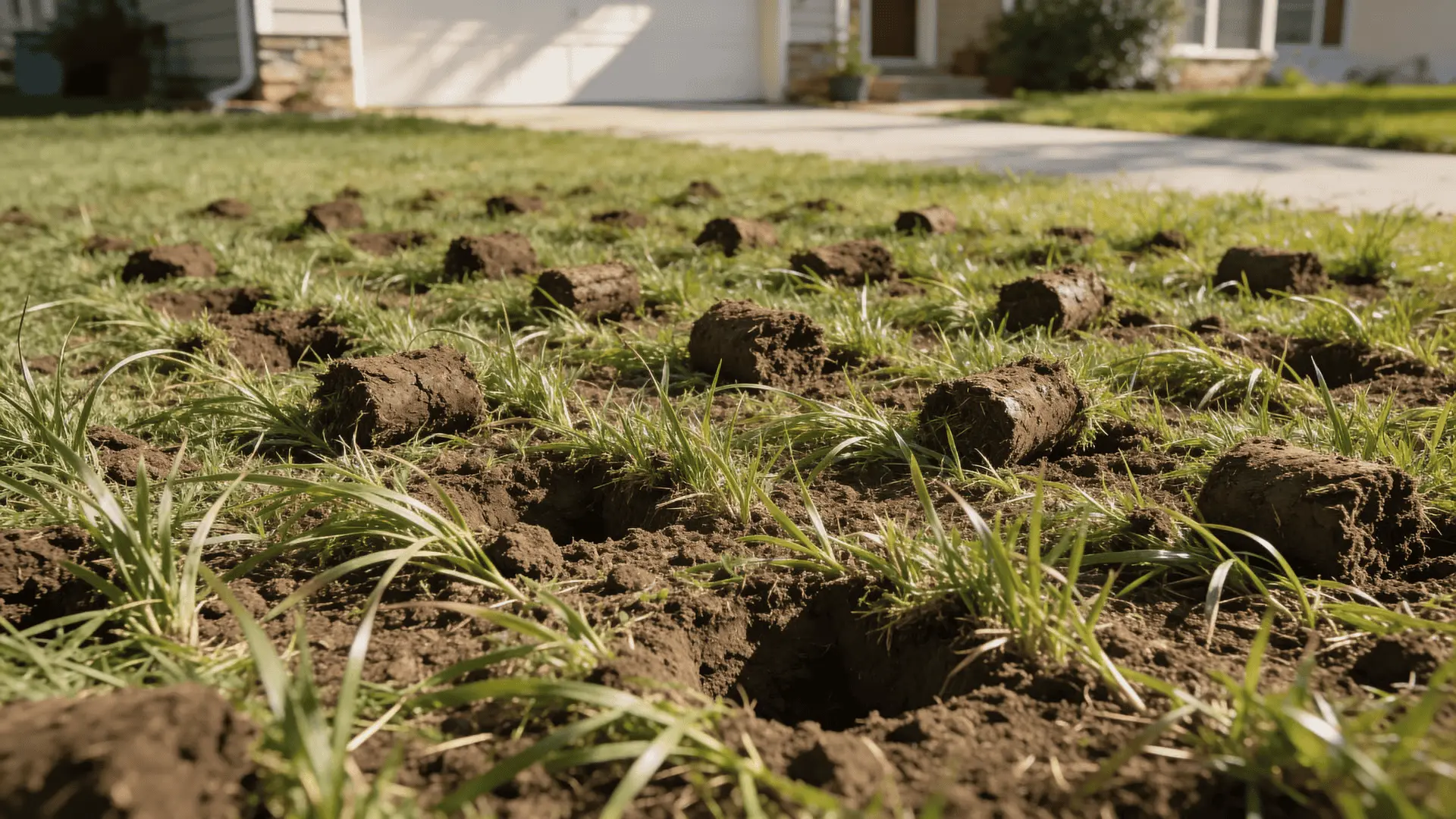Like water finding its path, you don’t have to decide tonight. You’re asking the right question: which permeable driveway option actually works for your home resin, pavers, or something else and what are the tradeoffs?
Start with this quick move: grab a hose or a bucket and pour water on the worst spot. Watching where it goes tells you a lot about whether you need a fully permeable system or better drainage planning.
If you’re seeing sheet runoff or lasting puddles, you’re in permeable territory. You can probably hear the water hissing and see it gathering at the same low spot every storm.
Today: 2 Fast Tests To Check Driveway Drainage
- The 2 minute hose test: Pour water on your current surface and time it. If it disappears in 30-60 seconds and doesn’t creep toward the street, your soil is doing some work already. If it sits for minutes or runs off immediately, you’ll want a true permeable system with a storage base. You’ll know it’s working when that test puddle starts “shrinking” from the middle rather than escaping at the edges.
- Soil soak test (no tools): Pick a bare spot by the driveway, pour a gallon of water into a 6-8 inch wide patch, and time how long it takes to disappear. Under 5 minutes = great infiltration. 5-15 minutes = workable with the right base. Longer than that = plan on an underdrain. Good sign: you’ll see a steady, even drop instead of a crust forming on top.
Permeable Driveway Options Compared: Resin, Pavers, Porous Mixes
- Resin bound gravel (permeable): A clean, seamless look made by binding small stones in a resin matrix that still lets water pass. Pros: sleek, comfortable to walk on, no loose stones, good permeability when installed over a proper open graded base. Cons: surface can amber with UV depending on resin type, not as easy to spot repair, needs careful prep. Beware sound alike “resin bonded” (not permeable see below).
- Permeable concrete pavers: Modular pavers laid with wider joints filled with clean aggregate (not sand) so water drains between units. Pros: highly durable, easy to lift/repair, colors and patterns galore, fully recyclable at end of life. Cons: higher upfront cost. Joints need occasional topping up. Typical systems have 8-20% void space and, when clean, shed heavy rain efficiently (roughly six inches/hour is a useful benchmark).
- Pervious concrete and porous asphalt: Monolithic surfaces with air voids throughout to let water move straight through. Pros: smooth, plow friendly, strong for large areas. Cons: can clog if not maintained. Restoration usually needs a vacuum sweeper rather than a shop vac. Expect similar drainage capacity to permeable pavers when new.
- Grass pavers (plastic grids): Honeycomb grids filled with soil and grass (or sometimes gravel). Pros: green look, keeps occasional use areas from turning to mud, excellent infiltration. Cons: needs sun and irrigation to stay healthy. Not ideal for constant turning/parking.
- Loose gravel with edging: Classic, most DIY friendly, inherently permeable. Pros: lowest materials cost, easy to refresh. Cons: ruts, migration, and dust. Needs a deep open graded stone base (about 12-18 inches) to drain well and feel solid.
Permeable vs Porous, Resin Bound vs Bonded: What They Mean
Two confusing pairs:
- Permeable vs porous: Permeable pavers drain through the joints between units. Porous asphalt/concrete drains through the material itself. Both can work what matters most is the base beneath.
- Resin bound vs resin bonded: Resin bound is permeable. Resin bonded is a scatter coat (stones broadcast onto sticky resin) and is not. Simple cue: pour a cup of water if it soaks through the surface itself, it’s resin bound. If it beads and runs off, it’s bonded.
Permeable Driveway Costs, Installed: National Price Ranges
- Permeable pavers: $10-40 per sq ft. Big range because patterns, colors, and base depth vary.
- Pervious concrete: $6-15 per sq ft.
- Porous asphalt: commonly similar to pervious concrete.
- Grass pavers (plastic grid): $5-10 per sq ft for the grid. Total depends on soil prep and irrigation.
- Resin bound gravel: often lands between premium gravel and pavers. Price swings with resin type and base needs.
- Loose gravel over a proper open graded base: materials are cheap. The base and edging are the real line items.
Rough math: measure length x width to get square footage. A 20’ x 40’ drive is 800 sq ft. At $18/sq ft, that’s about $14,400. This is why “pros and cons” matters you’re balancing upfront cost, look, maintenance, and performance.
Why It Works: Open Graded Stone Stores And Moves Water
Infiltration success is less about the surface and more about the system underneath. Open graded stone layers create storage (voids) so stormwater can sit safely and seep into soil.
If your native soil is slow (clay), the design adds an underdrain to move excess water to daylight or a drain line. That’s why identical looking driveways can perform very differently the subbase thickness, stone spec, geotextile, and outlet details are the real difference makers.
Maintenance By Surface: What Living With Each Option Is Like
Permeable pavers: Once or twice a year, blow off debris and top up joints with clean, angular chip if they settle. If a truck drips oil, lift a few units, refresh the bedding stone, and relay no patchwork scars.
Resin bound: Keep organics off the surface. A gentle pressure wash restores porosity if it films over. Avoid sharp snowblower blades.
Porous asphalt/concrete: Plan on periodic vacuum sweeping if you have lots of fines (dust, soil, leaf grind) blowing in. Regular sweeping keeps pores open. The first week after a good clean, you’ll notice rain vanishing instead of sheet flowing.
Grass grids: Treat it like a lawn mow, feed, and irrigate. Expect some repair at high turn areas.
Gravel: Rake and regrade as needed, top up annually. Edging helps a lot.
You’ll know you chose well when, in the first good rain after installation (often within 5-7 days), water disappears into the surface and you don’t see it racing to the street. By weeks two and beyond, the surface should feel solid underfoot with no “pumping” or mushy spots after storms.
How To Choose For Your Site: Soil, Loads, Aesthetic
If you want the most flexible, repairable long term option with half moon driveway ideas and tons of looks, permeable pavers are tough to beat. If you need a smooth, large surface (long drives, frequent snowblowing), porous asphalt or pervious concrete is practical.
If your heart wants that seamless, modern finish, resin bound is beautiful just make sure it’s truly resin bound and installed over an open graded base, not a solid slab. For budget or occasional parking, affordable driveway options like well built gravel or grass grids can be excellent, especially when paired with good edging and a correct stone base.
One candid thing we see in the field: most “permeable” failures aren’t about the product. They’re about a thin or wrong subbase, clogged joints, or no escape route for water. In 8-9 out of 10 problem jobs we’re called to evaluate, a proper open graded base and maintenance plan would have prevented the issue.
Codes, Climate, And Details That Matter For Permeable Driveways
- Codes/credits: Some municipalities offer stormwater credits for permeable surfaces. Others require an underdrain in slow soils. A five minute call to your building department can save redesign later.
- Freeze thaw: Open graded stone actually handles winter well because water has room to expand. Keep surfaces free of fines and use de-icers approved for your chosen material.
- Trees and shade: Resin bound and pavers handle shade fine, but more shade = more organic debris. Plan your maintenance cadence accordingly.
- Heavy vehicles: Frequent RV or delivery truck traffic? Favor pavers, pervious concrete, or properly engineered porous asphalt. Design the base to the load.
Decision Snapshot: Pros And Cons In Plain English
- Resin bound: Pros seamless look, permeable, comfortable to walk on. Cons UV/heat sensitivity depending on resin, trickier spot repairs, installer quality really matters.
- Permeable pavers: Pros durable, repairable, many styles, fully recyclable, great curb appeal. Cons higher upfront cost, joint upkeep.
- Porous asphalt/concrete: Pros smooth, strong, snowplow friendly. Cons needs periodic vacuuming. Repairs are more specialized.
- Grass grids: Pros green look, excellent infiltration. Cons needs lawn care. Not ideal for constant turning.
- Gravel: Pros cheapest, DIY friendly. Cons migration and ruts. More upkeep.
If you want a simple, low regret path: get a quick infiltration reading (even with the hose test), decide your aesthetic (seamless vs modular), then spec the base to your soil and vehicle loads. The surface you pick sits on that foundation get the foundation right and most choices will serve you well.
Need Help Deciding? Get A Same Week Site Consult
Whether you DIY or call us, start with facts: we measure infiltration, confirm soil type, and design the open graded base and underdrain (if needed) before talking finishes. We also check local rules and HOA requirements so your resin bound vs paver decision lines up with code.
If you’d like a same week consult, we can usually assess slope, soil, and base depth on site and leave you with a clear plan surface options, costs, and maintenance spelled out. Either way, you’ll know exactly which permeable driveway fits your home and why.








